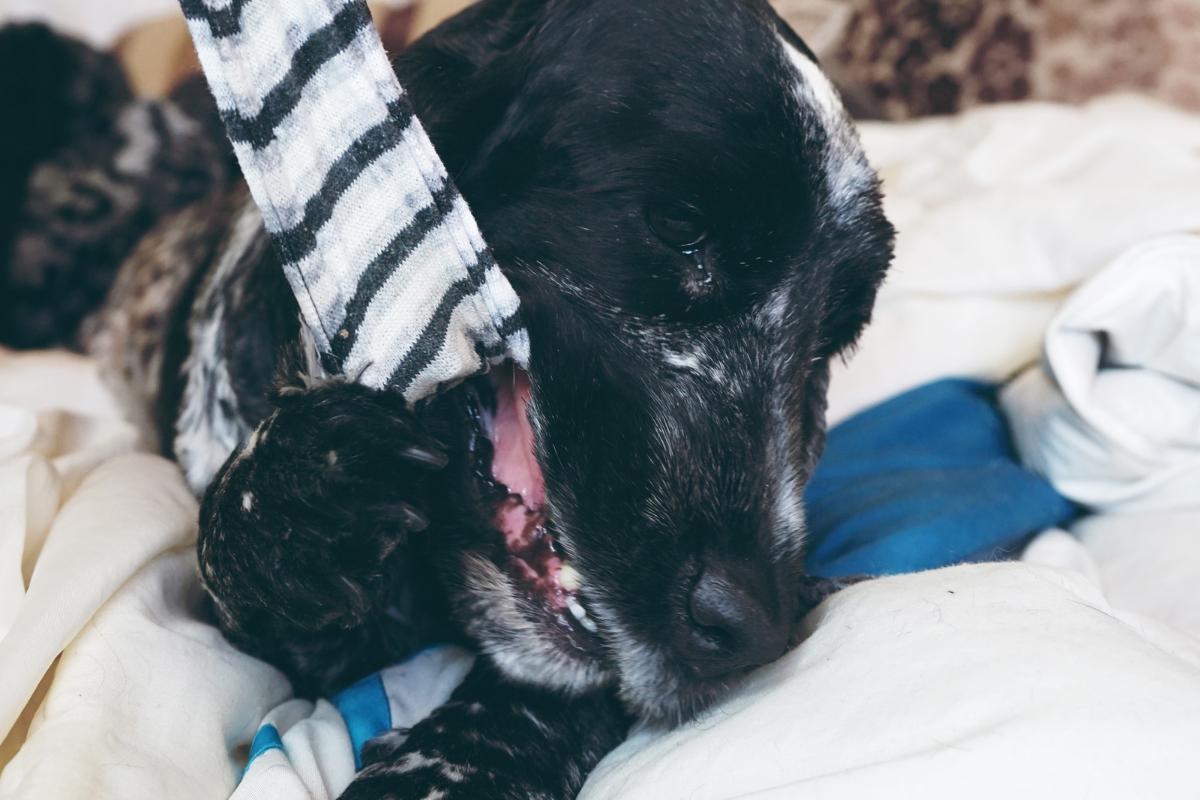My Dog Ate a Sock But Is Acting Normal



See files for Dogs
If your dog has swallowed a sock, the outcome will depend on various factors. These include the size of the dog, the type of sock and their overall health. Dogs chewing our shoes and socks is relatively normal behavior when they are a puppy. It is often a way to explore and they don't necessarily want to ingest the item. If they do swallow a sock, dogs usually vomit it up afterwards. The material cannot be digested by the dog's organism, but it is rare for it to pass through their entire digestive tract. This is why throwing it up is common. If your dog doesn't throw up the sock, it is possible that you will see signs or symptoms of discomfort.
At AnimalWised, we explain why my dog ate a sock, but it acting normal. If a dog does not throw up the sock after eating it, we need to know what potential effects these will have on the animal. If you are at all unsure of what to do, you should take the dog to a veterinarian.
Why has my dog eaten a sock?
Our dogs often seem to have a disproportionate interest in our socks and shoes. They will treat them as if they were their favorite toy, whereas we see them as simply protectors of our feet. There are various reasons for a dog's interest in our socks. They include the following:
- Look and texture: our socks are of particular interest to dogs because of how they appear to them. Socks are soft in texture, with some even being quite fluffy. This is reminiscent of a small mammal, a common prey animal for wild dogs. The desire to play and even eat a sock is likely because they see them as simulacra of such prey animals.
- Smell: while we might not associate the smell of socks as being pleasant, dogs may see things differently. The odor might intrigue them. This may also be due to the fact they are imbued with their owner's smell. Since our dogs recognize us by scent, the smell of our socks might be a way to feel closer to us.
- Play: if we look at many of the toys our dogs like to play with, it is almost as if they were modelled after socks. Pouncing on, playing with and chewing socks are activities puppies in particular like to enjoy, but many adult dogs will also not lose their interest in socks. They use them to play and explore their environment.
- Stress and anxiety: when a dog becomes obsessed with socks, it is possible they have an emotional or behavioral problem. Whether as a form of pica or an expression of obsessive compulsive behavior in dogs, the animal may use the sock to be destructive. This is because they don't know how to relieve their anxiety in a healthy way, so we need to be careful when we see this behavior happening all the time.
- Attention: dogs will see that socks belong to us. Since we often leave them on the floor, they are more accessible than other items. If a dog isn't getting the attention they think they deserve, they may eat our sock as a way to get our attention. Since we might scold them if they chew a sock, doing so affords them interaction, even if it is negative.
It is very important we look at the context of a dog's behavior to determine the reason why a dog ate a sock. We also need to consider our own behavior and the status of their environment. For example, if there is a change in the home dynamic, it might be causing them stress. Such changes may include the arrival of a new family member, moving home or other stressors from their environment.

What happens if a dog eats a sock?
The first thing we need to know is whether a dog has actually eaten a sock. Dogs will often play with, chew and rip apart a sock, but this does not mean they want to eat it. If you see a sock that has been torn up, but the material is still there, then you will not have much cause for concern. If you see all or much of the sock has disappeared, then we should presume they have eaten it.
As we stated above, dogs are unable to digest socks. The material can still pass through their gastrointestinal tract, but it will not be broken down like food. Especially if they eat it in shreds, the sock material might simply pass through and they will excrete it in their feces. If this is the case, you will eventually be able to see the undigested material in their stool. This is what happens if a dog eats a sock, but it acting normal.
If your dog ingests the sock whole, it is unlikely they will be able to digest it. This means the dog will not be acting normal. In most cases, the dog will throw it up. If they do not, then you will likely see digestive disorders and other problems. Such symptoms may include:
- Vomiting
- Abdominal pain
- Loss of appetite
- Apathy
- Diarrhea
- Absence of defecation
These symptoms usually take up to 24 hours to appear, but it is possible they may take longer. If you do start to see these symptoms and your dog, you should take them to a veterinarian. One important reason for this is the possibility of bowel obstruction. An intestinal blockage in dogs can be fatal if not treated promptly, especially if it leads to gastric torsion in dogs.
What do I do if my dog has eaten a sock
If your dog ate a sock, but is acting normal, you may not need to do anything. As explained above, it is possible the dog will vomit it up or it can pass through the digestive system. Large dogs may be more likely to digest the sock since it can pass through their digestive tract more easily. Small dog breeds or brachycephalic dogs might have more difficulty due to the size or conformation of their gastrointestinal system.
For dogs that have eaten a sock, but didn't throw it up, then we need to be very observant. We need to look for any of the signs mentioned above which can indicate potential digestive distress. Some people might recommend making your dog vomit, but this is something which should ideally be left up to the veterinarian. Rather than taking them to an emergency appointment, you can contact a vet by phone and heed their instructions.
When there is potential for obstruction, you will need to take the dog to the veterinarian since they can run diagnostic imaging tests. These include an x-ray, ultrasound or even an MRI scan. These tests will help to locate the position of the sock in their digestive tract. In doing so, they can determine how to best remove it.
In some cases, the veterinarian may be able to induce vomiting and the dog can throw up the sock without an invasive procedure. If the sock is close to the top of their digestive tract, it is possible the veterinarian may be able to remove it through the mouth. In cases where it is lower down, surgical intervention may be required.
For surgical removal of the sock, the dog will be anesthetized. After imaging tests, the veterinarian will have located the sock. They will make an incision in the skin as close as possible. They will then have to cut through and open any tissue necessary to access the sock. This is more or less difficult, depending on the location. In severe cases, it may be necessary to remove a section of intestine.
As you can see, this can lead to invasive treatments. Trust the veterinarian to make the best decision. Do not try to give home remedies to make the dog vomit or force digestion. These can make the situation much worse, even if it is simply to delay any necessary medical treatment.
How long does it take a dog to expel a sock?
As we have stated, a dog may eat a sock and act normal because it will pass through their digestive system without significant complication. In these cases, we will want to know how long it takes for a dog to pass a sock.
If it does occur that the dog is able to pass the sock through their digestive system, it should not take longer than 48 to 72 hours. There may be rare cases where it takes longer, some even staying in the digestive system for as long as 5 days. This is uncommon and you will likely observe symptoms of digestive stress before this time.
In cases where the dog has eaten a sock, but not thrown up, you should contact a veterinarian, even if they act normal. They will be able to advise on the best course of action and prevent dangerous repercussions. It is also important to know that if the dog is to throw up the sock after eating it, this will usually take up to 4 hours after ingestion. After this time, it will have traveled further into the digestive tract.
Learn about other serious digestive problems with our article on why my dog is vomiting blood.

How can I stop my dog from eating my socks?
The best way to prevent your canine companion from ingesting a sock is to prevent him from accessing it. Ensure you maintain a clean and tidy home, storing clean socks in drawers and dirty socks in laundry baskets. The dog should not be able to access either of these storage locations. You will need to do the same with other pieces of clothing which may be within their reach.
A dog eating a sock is not usually something that is related to nutrition. You should still ensure you provide the correct diet for their specific needs. This will help to avoid issues related to boredom which include eating socks or other types of destructive dog behavior.
Boredom-related problems also arise if the dog is not physically and mentally stimulated. This means you will need to walk and exercise them to the degree that suits their needs. When at home, they should have an enriched environment for dogs with toys and accessories that keep them entertained. Intelligence games for dogs can be particularly helpful.
Finally, if a dog is eating socks to get your attention, then you will need to ensure you provide more. Some dogs need more attention and affection than others. Do everything you can to ensure they are not stressed and have their needs met.
This article is purely informative. AnimalWised does not have the authority to prescribe any veterinary treatment or create a diagnosis. We invite you to take your pet to the veterinarian if they are suffering from any condition or pain.
If you want to read similar articles to My Dog Ate a Sock But Is Acting Normal, we recommend you visit our Prevention category.
- J. Cerón, M.J. Fernández, C. García, M. Hervera, S. M. Angulo, D. Pérez, C. Pérez, G. Santamarina. (2016). Clinical manual of internal medicine in small animals I. ESVPS, Ed. SM Publishing Ltd. Sheffield, UK.







